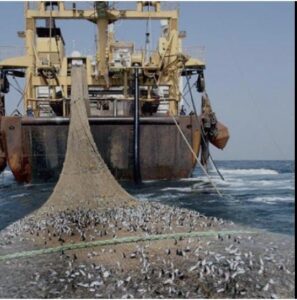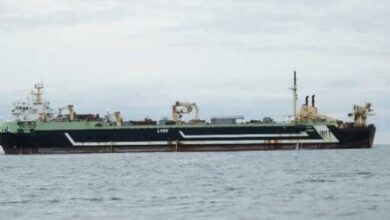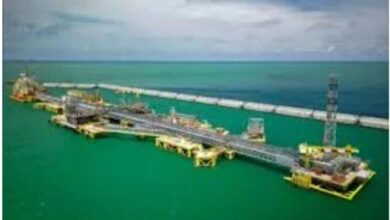Mauritania: Marine Wealth Feeding Foreigners, Enriching the Powerful

Investigative Report by:
Mohamed Abdarahmane Abdallah
Journalist – NouakchottoA
■ In a new move that sheds light on a deepening crisis, the French newspaper Le Monde has published an extensive investigative report revealing the alarming decline of Mauritania’s fishing industry — a sector long considered a pillar of the national economy and the country’s largest source of income after mining.
The investigation, which draws on official documents and testimonies from key actors in the field, paints a grim picture of the sector. It highlights how greedy foreign interests intersect with local corruption and poor governance, resulting in the systematic depletion of marine wealth — at the expense of traditional fishermen and future generations.
This report comes amid growing criticism both inside and outside the country over the unfair fishing agreements signed by Mauritania with foreign companies, particularly European and Chinese firms. These deals grant vast privileges to those companies in exchange for limited returns — returns that neither reflect the true value of the resources exploited nor contribute meaningfully to the development of local fishing infrastructure or the improvement of working conditions for Mauritanian fishermen.
In this context, Le Monde’s report raises essential questions about Mauritania’s food and economic sovereignty, and about the future of a sector that for decades was a cornerstone of development — now seemingly transformed into an open gateway for plunder and collapse.
Summary of Key Findings in the Le Monde Report and Other French Outlets:
■ Sharp Decline in Fish Stocks
Overexploitation is especially severe among small fish species (sardines, shad, and scomber), which are essential for local food security and widely used in fishmeal production.
In Nouadhibou Bay, there is a clear decline in fish availability, forcing traditional fishermen to venture farther out to sea — increasing costs, risks, and reducing profits.
■ Impact of Industrial Fishing on Reserves
Industrial vessels (mostly foreign) capture hundreds of tons per trip, feeding the fishmeal and fish oil industries. Example: one ship can return with 500 tons in just half a day.
This rapid industrial exploitation directly empties reserves that local populations rely on for basic nutrition.
■ Unbalanced Fishing Agreements
Under the EU-Mauritania partnership agreement (2021–2026), Europe pays around €57–57.5 million annually for access to Mauritanian waters. A portion is meant to support local infrastructure and communities.
Yet the real value of fish caught by European fleets is estimated at over €300 million per year — far exceeding what is paid.
Less than 2% of the fish are offloaded in Mauritania, and under 5% are processed locally, undermining local economic benefits and employment.
■ Weak Governance and Lack of Transparency
Despite the 2015 Fisheries Law and regulatory frameworks, implementation is poor.
Fishing licenses are often distributed non-transparently, and monitoring of foreign fleets is weak.
The sector also suffers from illegal, unreported, and unregulated (IUU) fishing, even in restricted areas and seasons, including inside the Banc d’Arguin National Park.
■ Social and Economic Dimensions
Around 300,000 people depend directly or indirectly on the fishing sector, which accounts for 10–20% of national income.
Yet the sector fails to deliver strong local economic impact: most fish are exported raw, leading to lost job opportunities and low value-added.
Women, especially in Nouadhibou, are being excluded from fair shares, adding to the economic fragility of coastal families.
■ Growing Impact of Climate Change
Ocean temperature changes are disrupting fish reproduction and migration patterns.
This raises uncertainty over fish availability in traditional fishing zones and adds new pressures on fishermen and ecosystems.
■ Reform Efforts and Recommendations
The number of industrial vessels has dropped from around 70 to fewer than 15.
Some fishmeal factories have shut down, and authorities are encouraging cooling and preservation instead of full fish processing.
The EU agreement includes scientific monitoring, quota setting based on data, and designated biological rest periods and no-fishing zones.
Experts now call for a 60% reduction in fishing activity to allow stocks to recover — this includes fewer ships, shorter seasons, and stricter law enforcement.
■ Conclusion:
The investigation warns of the destruction of a vital sector in a country where a large part of the population depends on it for food and economic survival. The root causes are:
Overexploitation of marine resources by foreign companies,
Imbalanced fishing contracts,
Weak governance and non-enforcement of regulations,
Environmental and climate deterioration affecting fish stocks.









